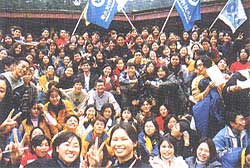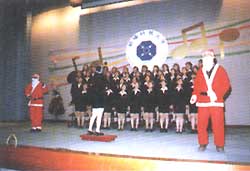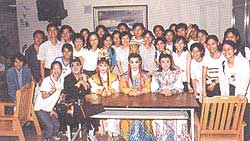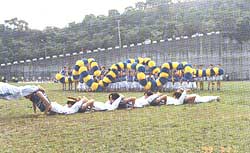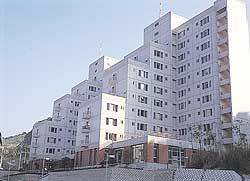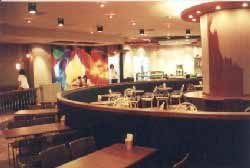 |
|||||||||
CYUT Facts |
|||||||||
| Campus Life | |||||||||
| Our Dormitory, Cafeterias, and Bookstore | |||||||||
| The Academic Exchange | |||||||||
| Campus Life | |||||||||
|
Chaoyang's students are drawn mostly from vocational and technical institutions, so that they come with strong professional backgrounds; after immersion in new theory and practice, Chaoyang's students are truly out of the ordinary. All freshman students are required to participate in labor education, as a part of the University's instruction in labor service, and philosophy of education for life. In addition, internships in industry are available during winter and summer breaks, as part of the school's efforts to turn students into productive intellectuals.
Student Organizations : Student activities are a reflection of society's activities, and a required course in any college education. In addition to gaining professional knowledge, physical and mental balance, and enriching leisure time, student activities provide the opportunity to acquire the knowledge and abilities associated with planning, carrying out, and evaluating activities, to learn the importance of communication, coordination, interaction, and team spirit, and to cultivate individual and group sense of honor. Student organization activities and experiences are in fact often essential elements in students' post-college professional development.
Student organizations at Chaoyang can be divided into five major types: general organizations, academic organizations, recreational groups, service groups, and social clubs. There are now 91 different organizations, groups, and clubs at Chaoyang, adding spice and variety to extra-curricular activities, and bringing youthful vigor and enthusiasm to the campus.
Facilities
for Students: The University now has two student dormitories, intended primarily for first-year students in 4-year programs. The on-campus dormitory has 264 rooms, each of which holds four occupants. All rooms are arranged suite-style, and come with telephones and network connections. The dormitory’s capacity is now 1,096. The off-campus dormitory is located approximately five to ten minutes away from the main campus, and has one, two, and our person rooms. Total capacity is 545. Both dormitories have cafeterias, laundry facilities, kitchens, supermarkets, convenience stores, automatic teller machines, and other convenient features. There are also dormitory counselors and security officers to provide other important services. In addition, there is an on-campus bookstore and coffee shop, which serves as informal gathering place for students and faculty.
|
|||||||||
| Our Dormitory, Cafeterias, and Bookstore | |||||||||
|
The University is located on the slopes of a hill not far from the Taiwan Cinema Studios. With no major retailing areas or shopping centers nearby, daily necessities are one of the University's larger concerns.
To ensure housing for all freshmen, the University has its student dormitory, where students are required to live during their freshman year. The dormitory has 244 suites and a total of 996 beds. It now holds 990 students, 440 men and 550 women. The dormitory also includes a number of other amenities for students' convenience. The first floor of the dormitory includes two cafeterias, one serving Chinese food and the other Western food. These cafeterias are open to the entire University community. Other areas of the dormitory include a laundromat, a large kitchen area, commons rooms on each floor of the dormitory, a supermarket, and automatic teller machines. Another important consideration for the University is students' textbook and reading materials. Since most major bookstores are located at least a half-hour's drive from the University, the University has arranged for Yu-shih Publishers to open a large bookstore in the lobby of the Design building.
 |
|||||||||
International
exchange plays an important role in the University's development plans.
In order to facilitate exchange, the University established an International
Affairs Section in the Office of Technology Cooperation in 1996. The
Section is responsible for handling academic cooperation with sister
schools, and assisting in international technical and scientific cooperation
and exchange. In December 1997, the University also established the
Committee for Academic Exchange and Cooperation, to meet the growing
needs of the University's cooperative programs.
The
University has signed cooperative arrangements or sister school agreements
with the following schools: Hochschule Bremen University of Applied
Sciences, Johannes Gutenberg-University Mainz in Germany, Oklahoma City
University, Shenandoah University, the University of Wisconsin- Platteville,
the University of Missouri-Rolla, California Polytechnic State University
in the U.S, the University of Ulster, the University of Newcastle upon
Tyne in the U.K, New Era College, Han Chiang College in Malaysia, Mongolian
University of Science and Technology, Tokyo Metropolitan Institute of
Technology in Japan, the University of Canberra, and Bond University
in Australia. It has also signed exchange memorandums with the Central
University of Finance and Economics, Ningbo University, and the University
of Science and Technology Beijing,
, Beijing Union University, Huazhong University of Science and Technology,
Shenzhen Polytechnic, Nanjing University of Technology,Tianjn
University of Science& Technology, Soochow University in
Mainland China. Academic exchange at the University includes student and faculty exchanges, cooperative sponsorships of international conferences, and invitations to notable scholars and experts from abroad for short-term lectures and tutorials. In addition, the University is actively developing cooperative agreements with well-known universities in Mainland China, Australia, Europe, Japan, Korea, and Southeast Asia, in order to expand the range and depth of its international academic cooperation. |
|||||||||
